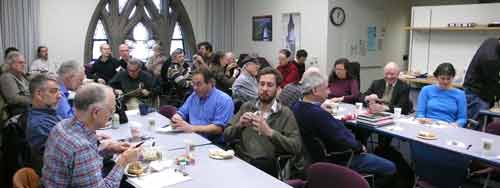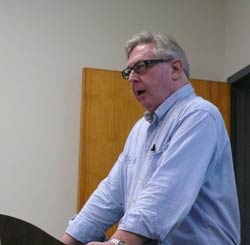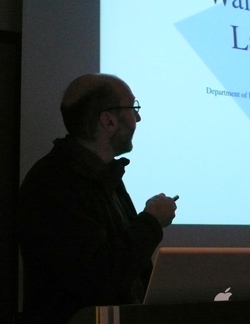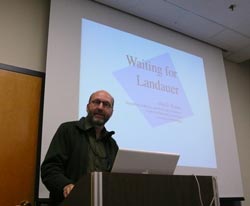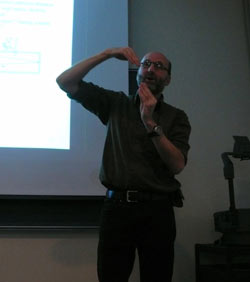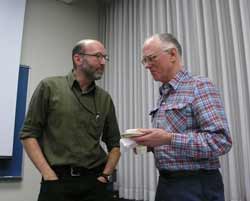

![]()
home
::: about
::: news
::: links
::: giving
::: contact
![]()
events
::: calendar
::: lunchtime
::: annual
lecture series
::: conferences
![]()
people
::: visiting fellows
::: postdoc fellows
::: senior fellows
::: resident fellows
::: associates
![]()
joining
::: visiting fellowships
::: postdoc fellowships
::: senior fellowships
::: resident fellowships
::: associateships
![]()
being here
::: visiting
::: the last donut
::: photo album
::: center home >> being here >> last donut? >> waiting |
Waiting The end of term is approaching quite quickly. After one of our busiest terms ever, we have only a few more events on the calendar. I find myself quite looking forward to the end of this term. Next term, finally, is my sabbatical leave. Then I will be able to think in peace.
Before the end of term comes, however, there is much to be done. And one of those things is to give a talk in today's lunchtime colloquium. I normally introduce speakers, but that would not work today. Joyce had floated into my office last week suggesting that we find someone else. Peter Machamer had answered the call. He can always be relied on. As the moment drew near, I began to regret my teasing of him from the chair in past talks. Since he tends to shout out comments, especially when I am struggling to introduce a speaker, I began to announce preemptively that Peter is our "designated heckler." It was payback time. While the room was called to order, I managed to take a few photos. Peter began his introduction.
"Thank you very much, Peter. That was sweet ... I think."
What caught our attention were the persisting claims that Maxwell's demon must fail because of some hidden thermodynamic cost in processing information. The demon would need to locate the positions of individual molecules and those efforts must, we were first told, be so costly in entropy production as to protect the Second Law of Thermodynamics.
Alas, as we delved deeper into the literature we found that things just weren't working as advertised. The literature seemed to be powered by circular argumentation or speculative posits. In physics, some ideas are just so extraordinary that they capture us. They are so alluring that we just don't want them to be wrong. We are in love and our besotted eyes overlook the flaws in the the ideas that have captured our hearts. That is fine when those ideas are merely poorly presented but somewhere have a sound grounding. This, we soon concluded, was not one of those cases.
This new idea, called "Landauer's Principle," we had quickly seen was prone to the same circular reasoning as the earlier tradition. Later, closer inspection of the proofs of the principle offered in the literature showed me that they were based on rather straightforward misapplications of statistical physics. These I had laid out as clearly as I could in a 2005 paper. If you are merely uncertain about the data held in a memory device, you cannot translate that probability into a thermodynamic entropy that has the same meaning of the thermodynamic entropy of steam locomotives. All this was background. My paper today continues the review of the downward slide of the this literature. You can find a draft, "Waiting for Landauer," on my website. The one posted now is an early draft. A diligent referee has sent me back to it and the resulting revisions are strengthening the paper considerably. I'll post the revision when it is finished.
Worse, I now realized that the literature had no business positing the processes it did as primitives. It assumed that one could ascertain the content of a memory device without thermodynamic cost. Or that one could expand a one molecule gas reversibly in the thermodynamic sense. A long tradition tracing back to Smoluchowski in the 1910s has show that microscopic processes of these types would be fatally disrupted by fluctuations. Just that seemed to be likely with these processes. Credible realizations of the processes were readily seen to fail when fluctuations were considered. My conclusion, sadly, was simple: this literature is a mess. During my talk, I kept watching Bob Griffiths, a physicist from neighboring CMU. He was sitting near the front and taking copious notes. He would be a tenacious antagonist if he disagreed. At the break, I hesitantly said to him; "I was hoping that you are not working on this subject." "Oh no, he replied," with his eyes widened in surprise, "that's just what I'm working on." A few moments ago, I picked up an email from him. Just where on my website was the paper that I'd mention to him? And then a few minutes later there is a second email. John D. Norton |

